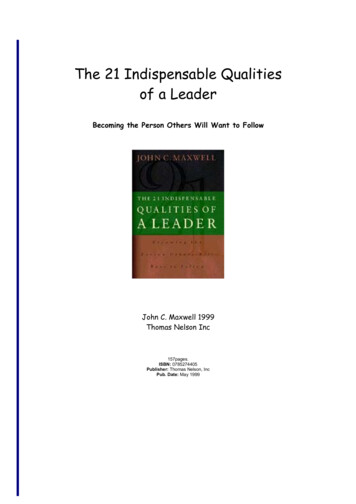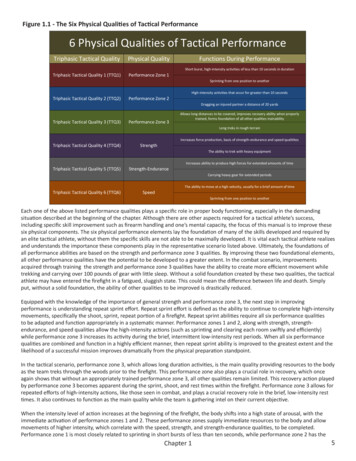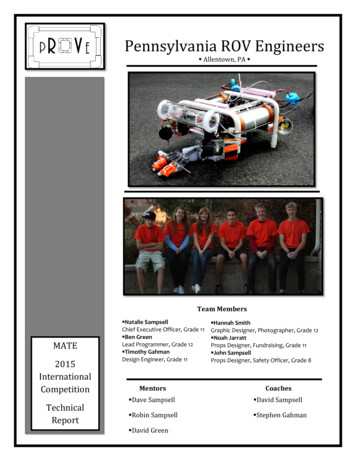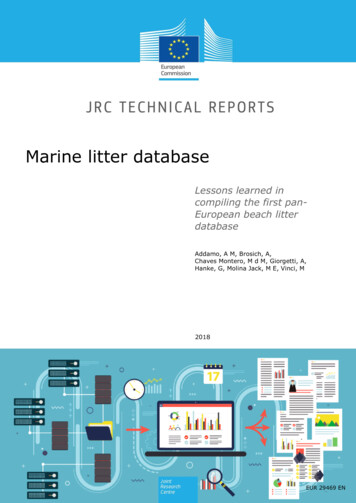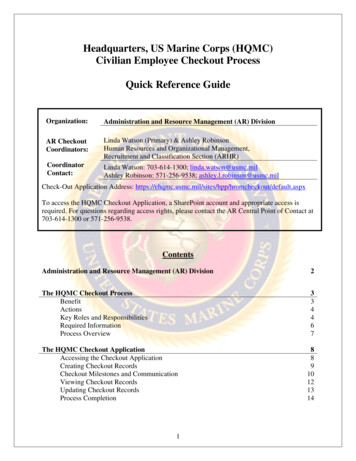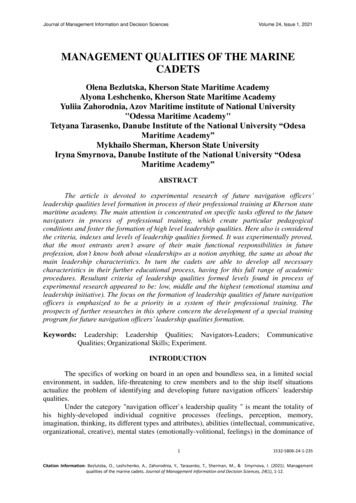
Transcription
Journal of Management Information and Decision SciencesVolume 24, Issue 1, 2021MANAGEMENT QUALITIES OF THE MARINECADETSOlena Bezlutska, Kherson State Maritime AcademyAlyona Leshchenko, Kherson State Maritime AcademyYuliia Zahorodnia, Azov Maritime institute of National University"Odessa Maritime Academy"Tetyana Tarasenko, Danube Institute of the National University “OdesaMaritime Academy”Mykhailo Sherman, Kherson State UniversityIryna Smyrnova, Danube Institute of the National University “OdesaMaritime Academy”ABSTRACTThe article is devoted to experimental research of future navigation officers’leadership qualities level formation in process of their professional training at Kherson statemaritime academy. The main attention is concentrated on specific tasks offered to the futurenavigators in process of professional training, which create particular pedagogicalconditions and foster the formation of high level leadership qualities. Here also is consideredthe criteria, indexes and levels of leadership qualities formed. It was experimentally proved,that the most entrants aren’t aware of their main functional responsibilities in futureprofession, don’t know both about «leadership» as a notion anything, the same as about themain leadership characteristics. In turn the cadets are able to develop all necessarycharacteristics in their further educational process, having for this full range of academicprocedures. Resultant criteria of leadership qualities formed levels found in process ofexperimental research appeared to be: low, middle and the highest (emotional stamina andleadership initiative). The focus on the formation of leadership qualities of future navigationofficers is emphasized to be a priority in a system of their professional training. Theprospects of further researches in this sphere concern the development of a special trainingprogram for future navigation officers’ leadership qualities formation.Keywords:Leadership; Leadership Qualities; Navigators-Leaders;Qualities; Organizational Skills; Experiment.CommunicativeINTRODUCTIONThe specifics of working on board in an open and boundless sea, in a limited socialenvironment, in sudden, life-threatening to crew members and to the ship itself situationsactualize the problem of identifying and developing future navigation officers leadershipqualities.Under the category "navigation officer s leadership quality " is meant the totality ofhis highly-developed individual cognitive processes (feelings, perception, memory,imagination, thinking, its different types and attributes), abilities (intellectual, communicative,organizational, creative), mental states (emotionally-volitional, feelings) in the dominance of11532-5806-24-1-235Citation Information: Bezlutska, O., Leshchenko, A., Zahorodnia, Y., Tarasenko, T., Sherman, M., & Smyrnova, I. (2021). Managementqualities of the marine cadets. Journal of Management Information and Decision Sciences, 24(1), 1-12.
Journal of Management Information and Decision SciencesVolume 24, Issue 1, 2021high level of energy as a factor, that induces the subordinates to realize their tasks in order toensure the safety of navigation.Therefore, one of the important tasks of professional training for future navigators isto create favorable pedagogical conditions for the formation and development of a high levelof leadership qualities. In its turn, the formation and development of leadership qualities offuture navigators-leaders should be followed by systematic diagnostics and pedagogicalcorrection of the results.The relevance of leadership in the collective management, its theoretical and practicalsignificance, is strongly evidenced by the analysis of recent research and publications inwhich a solution to this problem has been initiated. Some aspects of this problem werestudied by Kokun et al. (2012). Today, however, there is still no holistic approach to the studyof leadership qualities of navigators that would meet the requirements of modern maritimeinternational conventions. The research is based on the studies of foreign authors andUkrainian scientists (Pozolotin et al., 2007). The problem of leadership and leadershipqualities is also being studied by modern Ukrainian scientists and scholars of other countries(Fetyskyn et al., 2002; Smoliuk, 2018).Emphasizing previously unsolved parts of a common problem; the analysis of thepsychological and pedagogical literature showed that, despite the considerable amount ofscientific research, the problem of development of leadership qualities of navigators in theperiod of their studies at the maritime higher education institution requires new approachesfor theoretical generalization and practical solution.The purpose of the article is to determine experimentally the level of leadershipqualities of future navigators in higher education institution and find methods that wouldenhance the level of leadership qualities of maritime cadets in process of their professionaltraining.MATERIALS AND METHODSLeadership as a norm on board is established by the leading documents ofinternational maritime navigation, in particular the International Convention STCW-78/95,and such a document as the International Safety Management Code-ISM Code obliges theestablishment of a special hierarchy of relations on board and promotes the ensuring ofnavigation safety by installing a Ship Safety Management System (Pozolotin et al., 2007)with appropriate levels of responsibility and rapid response.The model of navigators leadership qualities consists of three levels: 1) the level ofemotional stability; 2) the level of leadership initiative; 3) the level of professionalcompetence. Since cadets are still in the process of vocational training, it is too early to askthe level of their professional competence as future leaders, and therefore this level willbecome relevant only after they finish their marine practice.Therefore, the subject of our attention will be the development of psychological basesfor cadets-navigators leadership qualities development of the first and second level.Kherson State Maritime Academy was chosen as the experimental base for theresearch. The 1st-year cadets of two study groups of the Navigation Department of KhersonState Maritime Academy in a total number of 50 persons were selected as the respondents.The choice of this age group was conditioned by the prospect of their further professionaltraining at KSMA and the formation on this basis of the first two blocks of levels of theirleadership qualities - emotional resilience and leadership initiative, subject to psychologicalsupport.21532-5806-24-1-235Citation Information: Bezlutska, O., Leshchenko, A., Zahorodnia, Y., Tarasenko, T., Sherman, M., & Smyrnova, I. (2021). Managementqualities of the marine cadets. Journal of Management Information and Decision Sciences, 24(1), 1-12.
Journal of Management Information and Decision SciencesVolume 24, Issue 1, 2021The research was conducted in three stages. The first stage included the preparatorywork, which involved the familiarization with the problem of research, the determination ofthe content of the main categories, scientific approaches to the study of the problem ofleadership in scientific literature. In the second stage, an ascertaining experiment wasconducted, which aimed at identifying the first-year cadets leadership qualities that areincluded in the previously defined leadership model of navigators -leaders, at their initial level.The results obtained in the process of the ascertaining experiment made it possible to providethe psychological bases for further development of their leadership qualities at appropriatelevels by developing a special training program and conducting the psychologicaldevelopment work with the cadets of the experimental group. The next step consisted ofchecking the level of leadership development in the cadets of the experimental groups ofKSMA, and comparing the results with those of the control group.In order to select the techniques that allow determining the level of cadets leadershipqualities studying at the maritime institution, we have analyzed the diagnostic methods andtheir capabilities. The detection of the level of development of cadets leadership qualitieswithin the framework of the ascertaining experiment was carried out on the basis of theappeal to the group of empirical methods offered by scientists (Evtikhov, 2007, Kokun et al.,2012).Thus, the method of document analysis allowed us, on the basis of acquaintance withthe specific materials (cadet s personal case, that reflects his interests and psychologicalcharacteristics, questionnaire, conversation results), on the basis of their analysis, comparisonand synthesis to interpret their essence and translate the fixed information into the status ofsense. This intellectual procedure was the basis for the development of further trainingprogram for updating leadership qualities of the future navigators. We also used the classicalempirical method of conversation.The conversation as a form of information gathering method (Evtikhov, 2007, Kokunet al., 2012) opened great opportunities for conclusions about the psychological signs of nonverbal communication of future navigators in the systems "researcher-cadet", "cadet-cadet","cadet-psychologist". The conversation itself, despite the considerable time consuming,provided the opportunity to communicate directly with each cadet of the experimental groupin order to draw conclusions about the degree of their communication skills development, thetendency to take the initiative in the conversation and to be a leader in it, about the speed oftheir response to the questions asked, its content etc.The information received from the cadets on the basis of the interview made itpossible to establish the presence of psychological signs of leadership of future navigators.We used the survey method in its broader format- the questionnaire. Questionnaires as acomponent of psycho diagnostic techniques, by the definition of scientists, allow theresearcher to obtain information of subjective-objective origin through the respondents answers to the questions in the form of statements. They are classified by scientists into threemain groups: state questionnaires; personal questionnaires; questionnaires (Evtikhov, 2007).Based on the specifics of our research topic, we used questionnaires.Developing the questionnaire s content, we adhered to certain rules: a) determiningthe content of the questionnaire, which acted in the form of questions for cadets: thesequestions concerned the self-assessment of the level of personal leadership qualitiesdevelopment, his attitude to the future profession, its main functions, the nature ofinterpersonal communication, other; b) we have chosen open-ended questions, as it providedmore complete students answers which were to analyzed and summarized.31532-5806-24-1-235Citation Information: Bezlutska, O., Leshchenko, A., Zahorodnia, Y., Tarasenko, T., Sherman, M., & Smyrnova, I. (2021). Managementqualities of the marine cadets. Journal of Management Information and Decision Sciences, 24(1), 1-12.
Journal of Management Information and Decision SciencesVolume 24, Issue 1, 2021We used the expert method, in other words - the "method of expert evaluation" of thelevel of development of cadets leadership qualities by the two main levels we defined(Smoliuk, 2018). Practical psychologist working on the staff of KSMA, curators of traininggroups, and teachers of individual disciplines of the humanitarian cycle acted as experts. Thesignificance of this method was that the experts' information made it possible to analyze thepresence of certain leadership qualities in specific cadets of the group, the frequency of theirmanifestations, belonging to the first level of emotional stability or to the second - the level ofleadership initiative more deeply.RESULTS AND DISCUSSIONBased on the use of the method of independent characteristics, the expert-psychologistmade his conclusions taking into account the cadets environment- teachers, Vice-Rector foreducational work. Thus, at the beginning of the academic year, the psychologist of KSMAtested the cadets of these two groups in order to determine the level of development of theircommunicative qualities and organizational capabilities by the method of COA by Kokun et al.(2012). As a result of the survey analysis, the following results were obtained (Table 1).TABLE 1THE RESULTS OF DIAGNOSING THE LEVEL OF COMMUNICATIVE QUALITIES OFTHE 1st YEAR CADETS AT THE INITIAL STAGE OF THEIR STUDY AT KSMAThe level of communicative qualities developmentLowMediumAbs.%Abs.%Abs.Experimental group312%124810Control group624%1144%8High%40%32%That is, at the beginning of the academic year, communicative qualities wereidentified in each group of first-year cadets, corresponding to three major levels: high,medium and low. The analysis of the results made it possible to conclude that the number ofcadets with the same level of communicative qualities development was almost identical ineach group. Thus, the highest number of cadets in both groups was characterized by theaverage level of communicative qualities development - 48% and 44% respectively.The highest level was shown by 40% and 32% respectively. An equally smallerpercentage of low level of communicative qualities development was found in 12% and24%. In general, at the beginning of the study at the maritime higher education institution,most freshmen were characterized by the availability of communicative qualities, namely82%, which allow furthering purposely improving them on the basis of psychological basicsprovision.Also, at the beginning of cadets training at KSMA, a psychologist, based on thereference to the same methodology, conducted a diagnostic study concerning theidentification of the level of organizational capabilities development in freshmen.Consequently, the following results were obtained (Table 2).The diagnosis analysis revealed that there are significantly more freshmen whoseorganizational capabilities are at a low level of development, respectively in the experimentalgroup 24% of the total number of people in the group and in the control group 32%.However, in each group, were identified a significant number of cadets 40% whose41532-5806-24-1-235Citation Information: Bezlutska, O., Leshchenko, A., Zahorodnia, Y., Tarasenko, T., Sherman, M., & Smyrnova, I. (2021). Managementqualities of the marine cadets. Journal of Management Information and Decision Sciences, 24(1), 1-12.
Journal of Management Information and Decision SciencesVolume 24, Issue 1, 2021organizational capabilities were at a high level of development, which was an objectiveprerequisite for the further formation of navigators-leaders.In order to identify the students level of knowledge about the specifics of the rightsand duties of the captain as the main leader on the ship, as well as their knowledge of theessence and importance of leadership qualities they will need in their future profession, wedeveloped the content of the questionnaire, which reflected the focus of the topic of ourresearch, and was accessible to the first-year cadets. The questionnaire was filled in by cadetsin a group during a lecture with pre-set on self and quick answers.TABLE 2RESULTS OF DIAGNOSING THE LEVEL OF ORGANIZATIONAL CAPABILITIES DEVELOPMENT IN THE FIRST-YEAR CADETSExperimental groupControl groupLevel of organizational capabilities 1010%4040To the first question ("Are you familiar with the main task of the captain on board?")16 cadets (32%) answered "not quite", 25 (50%) "yes" and "no" 9 (18%).On the second question (“What are the most important qualities for a captain, in youropinion?”) 47 cadets (94%) named the captain's character traits as chief qualities, including“rigor”, “responsibility”, “determination”. Three freshmen failed to respond (6%).The third question ("In your opinion, are these qualities a captain receives from a birthor can he develop them purposefully?") was answered: "from birth" 11 cadets (22%), "candevelop" 39 (78%).The next question ("What qualities of a captain do you think relate to those of aleadership?") was answered by a quarter of cadets, i.e. 25%.The fifth question ("Do you think you already have some leadership qualities? Whatare the specific ones") was answered as follows: "Yes" 7 people (14; "I like to manage", "Ilike order", " I want to be a captain ", another 39 cadets (72%);" I do not know " 4 (8%).To the sixth question ("How often do you conflict with friends, acquaintances oruniversity professors? With who in particular?"), more than half of the respondents expresseda tendency to conflict (31 persons, i.e. 61%), answered "Never" 7 cadets. "Sometimes" 12(24%). Out of the 43 freshmen who acknowledge the conflict within their lives ("Yes","Sometimes") 19 cadets (44.27%) had conflicts with their parents, 11 (25.63%) with friends,9 with school teachers (20, 97%), with teachers of KSMA 4 (9,28%).To the seventh question ("Do you manage to solve any conflict between friends,relatives or acquaintances by yourself?"), the answers were as follows: "It is possible" 26(52%), "Sometimes" 17 (34%). No 7 people (14%).To the eighth question ("Were you tired during the first year of study during the firstsemester?) 38 cadets answered" Yes "(76%)," No” 12 (24%).The responses to the question, "What is your grade point average in the first session?"showed that 13 (26%) of freshmen have a GPA greater than 4.0; 37 (74%) lower than 4.0points.To the following question ("How often do you feel the desire to help your classmatesin their educational tasks?") 24 (48%) cadets answered "Never", "Sometimes" 17 (34%), 9(18%) constantly.51532-5806-24-1-235Citation Information: Bezlutska, O., Leshchenko, A., Zahorodnia, Y., Tarasenko, T., Sherman, M., & Smyrnova, I. (2021). Managementqualities of the marine cadets. Journal of Management Information and Decision Sciences, 24(1), 1-12.
Journal of Management Information and Decision SciencesVolume 24, Issue 1, 2021The questions “If you find yourself in an unexpected or extreme situation, what statesare you experiencing: fear, despair, confusion; are you trying to overcome the difficultsituation by yourself; to ask for a help from others? "provided the following answers:" fear,despair, confusion "6 (12%) cadets; "Trying to overcome the difficult situation by myself "33 (66%); "Ask for help" 11 (22%).To the question "What qualities of a captain do you consider to be negative as theydiminish his authority?" 18 cadets answered "I do not know" (36%), 32 (64%) answered"Doesn't worry about the team", "Loads with work", "Shows superiority to his subordinates"and the like.The analysis of answers allows us to draw the following conclusions: half (50%) of freshmen do not yet have a clear idea of their basic functionalresponsibilities in the future, are unfamiliar with the essence of "leadership"phenomenon, the basic leadership qualities that they must possess in the future onboard as a navigator; accordingly, they are characterized by the lack of sufficientvocabulary to explain the essence of leadership qualities, the presence andnecessity of which they are not yet aware of; the first-year cadets of theNavigation Department do not have a clear idea of the psychological portrait ofthe captain-leader, whose professional image should be a model for each freshmanin order to ensure a high level of leadership development from the beginning oftraining in a maritime institution; however, cadets consider it possible to developtheir leadership qualities in the further learning process;the vast majority of future navigators are prone to conflict situations (86%), whichsuggests that they have a low level of prudence and emotional stability, but thesame number (43, i.e. 86%) considers it possible to be able to solve the conflictson their own
Management qualities of the marine cadets. Journal of Management Information and Decision Sciences, 24(1), 1-12. high level of energy as a factor, that induces the subordinates to realize their tasks in order to ensure the safety of navigation. Therefore, one of the important tasks of Author: Bezlutska, Leshchenko, Zahorodnia, Tarasenko, Sherman, Smyrnova

